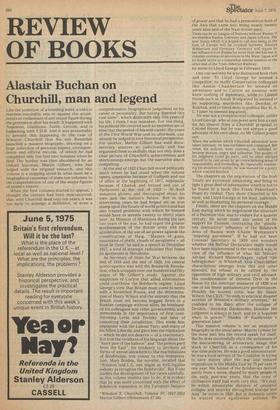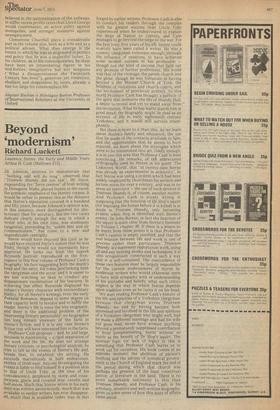Alastair Buchan on Churchill, man and legend
Like the undertow of a receding wave, a critical reaction inevitably sets in against the attainments or credentials of any major figure during the generation after his death. It happened with Napoleon, Gladstone, Stalin, Lincoln, and is happening with F.D.R. And it was presumably to prevent this happening in the case of Winston Churchill that his son Randolph launched a massive biography, drawing on a huge collection of personal papers, correspondence and official records, of which he had completed only the first two volumes when he died. The burden was then shouldered by an Oxford historian, Martin Gilbert, who had helped with the original research, and this volume is a stepping stone in what must be a biographical causeway of some ten volumes, to the comprehension of one of the major figures of modern history.
When the first volumes started to appear, I thought the venture had been misconceived; that, with Churchill dead only ten years, it was too early to attempt a definitive, or even a comprehensive, biographical judgement on his career or personality. But having digested this vast tome*, which deals with only five years of his life, I think I was mistaken. For one thing, his political life covered such an immense arcof time that the period of his mid-career, the years of the First World War and its aftermath, can already be judged in true historical perspective. For another, Martin Gilbert has used documentary sources so judiciously and has organised them so skilfully that not only does a clear picture of Churchill's achievements and shortcomings emerge, but the narrative also is compelling.
At the end of 1922 Churchill stood politically much where he had stood when the volume opens, unpopular because of Gallipoli and out of office at the beginning of 1917, unpopular because of Chanak and Ireland and out of Parliament at the end of 1922 — in both instances gloomy and discouraged about his own and the nation's future. But in the intervening years he had helped set an iron stamp upon the future of world politics and had also created problems with which he himself would have to wrestle twenty to thirty years later. As Minister of Munitions during the last. two years of the war, he had urged the greater mechanisation of the British army and the acceleration of the use of air power against the conservatism of Haig. "Masses of guns, mountains of shells, clouds of aeroplanes — all must be there" he said in a speech in December 1917, a kind of strategic radicalism that found its apotheosis at Hiroshima.
As Secretary of State for War between the end of 1918 and the end of 1920, his central preoccupation was with the Bolshevik Revolution, which occupies over one hundred and fifty pages of Mr Gilbert's study. Against the scepticism of Curzon that allied intervention could overthrow the Bolshevik regime, Lloyd George's view that Britain must come to terms with a Sovietised Russia, and the determination of Henry Wilson and the military that the British must not become bogged down in a Russian campaign without allies, he bombarded his colleagues and other governments with memoranda in the importance of first overthrowing Lenin and Trotsky and later of containing their jurisdiction. This made him unpopular with the Labour Party and many of his fellow Liberals, and gave him the reputation — which he did not deserve — of a reactionary. It is true the vividness of his language about the -hairy paw of the baboon" and "the poison peril from the East", his tendency to attribute all forms of unrest anywhere to the machinations of Bolshevism, lent colour to this interpretation. Mary Borden, the novelist, recalled that "Winston told L.G. one might as well legalise sodomy as recognise the Bolsheviks". But if one studies the development of his views carefully, as this volume enables one to do, it is evident that he was more concerned with the effect of Bolshevik expansion in the European balance *Winston S. Churchill, Volume IV, 1917-1922 Martin Gilbert (Heinemann £7.50)
of power and that he had a premonition both of the Axis that came into being nearly twenty years later and of the Nazi-Soviet pact: There can be no League of Nations without Russia. If we abandon Russia, Germany and Japan will not. The new States which it is hoped to call into being in the East of Europe will be crushed between Russian Bolshevism and Germany. Germany will regain by her influence over Russia far more than she has lost in colonies overseas or provinces in the West. Japan will no doubt arrive at a somewhat similar solution at the other end of the Trans-Siberian Railway.
he wrote to Lloyd George in February 1919.
One can see why he was distrusted both then and later. To Lloyd George he seemed a competitor, to stuffy Conservative colleagues like Austin Chamberlain he seemed an adventurer and to Curzon an amateur who knew nothing of diplomacy, while • to Liberal friends such as Josiah Wedgwood he seemed to be supporting murderers like Denikin or Kolchak, and to timid dons in politics like H. A. L. Fisher he seemed impatient.
He was not a conspiratorial colleague, unlike Lloyd George, Who at one point sent him a copy for his dissent from a Churchill proposal to Colonel House, but he was not always a good advocate of his own ideas. As Mr Gilbert points out: When the policies which Churchill advocated were taken seriously, he was confident and composed. But when his policies were rejected, or belittled he became morose, angry and inflexible. The quality of his judgment could ' go awry, and he often allowed himself to be cast down by an overwhelming sense of responsibility and foreboding. By repeatedly expressing his anxieties in public, he was blamed for a policy which was not his own.
The chapters on the negotiation of the Irish Treaty are extremely interesting and bring to light a great deal a information which is not to be found in a book like Frank Pakenham's Peace by Ordeal. They show Churchill at his most, and Lloyd George at his least, judicious, as well as illustrating his personal courage. Finally, there are the chapters on the Middle East during which he negotiated the structure of a Palestine that was to endure for a quarter century. He never made any secret of his support for Zionism, contrasting the "absolutely destructive" influence of the Bolshevik Jews of Russia with Chaim Weizmann's "inspiring movement". If he had not been Colonial Secretary in 1920 one wonders whether the Balfour Declaration really would have been implemented to the extent it was, in view of the influence of what his Military Adviser, Richard Meinertzhagen, called "the _hebraphobes" in Whitehall. One Churchillian characteristic emerges from this and other episodes, his refusal to be rattled by the opposition of high military and civil advisers. His condemnation of General Dyer in the House for the Amritzar massacre of 1920 was one of his finest parliamentary performances. Possibly his sourest critic was Sir Henry Wilson, the CIGS. "So ends in practical disaster another of Winston's military attempts," he confided to his diary after the collapse of Denikin, "Antwerp, Dardanelles, Denikin. His judgment is always at fault, and he is hopeless when in power." Shades of Alanbrooke a generation later!
This massive volume is not an analytical biography in the usual sense. Martin Gilbert for the most part lets the record speak for itself. But he does successfully elicit the unfairness of the buccaneering or aristocratic image that stuck to Churchill as a consequence of his war-time policies. He was a good administrator; he was a loyal servant of the Coalition in trying to save money after the war and reduced expenditure'in the Middle East by 75 per cent in one year. His hatred of the Bolsheviks derived partly from a sense, shared by many people in the early post-war years, that the crust of civilisation itself had worn very thin. "We ma)/ be within measurable distance of universal collapse and anarchy throughout Europe and Asia" he wrote in 1920. But in domestic terms he wanted more egalitarian policies. He
believed in the nationalisation of the railways, in stiffer excess profits taxes than Lloyd George would countenance, an active policy against monopolies, and stronger measures against unemployment.
Clementine Churchill plays a considerable part in the volume also, both as a wife and as a political adviser. What does emerge is the extent to which he was so engrossed in politics and policy that he was a neglectful father. To his children, as to his contemporaries, he must have been an intimidating figure in his mid-forties, imaginative but not sanguine ("What a disappointment the Twentieth Century has been"), generous yet vindictive, ebullient and despondent by turns, already a size too large for commonplace life.
Alastair Buchan is Montague Burton Professor ofInternational Relations at the University of Oxford



































 Previous page
Previous page